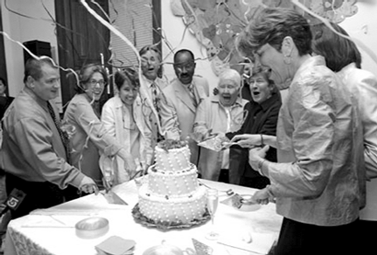Opponents of 2003 state court ruling cannot mount 2006 ballot challenge
Supporters of same-sex marriage in Massachusetts won a dramatic victory on Wednesday, staving off an effort to put a constitutional amendment on the November 2006 ballot to overturn the 2003 ruling by the Supreme Judicial Court there and instead provide civil unions for gay and lesbian couples.
The effort to amend the state Constitution was defeated in a 157 to 39 vote by the state Legislature sitting in a joint-chamber Constitutional Convention.
“It was a tremendous, tremendous victory,” Marty Rouse, executive director of MassEquality, a coalition of groups working to defend gay marriage, said in a telephone interview. “We have built the strongest grassroots movement for equal rights in this state’s history.”
The win clearly reflected intensive efforts on the part of the gay community and its supporters. In March 2004, the Legislature also met as a Constitutional Convention, and in a narrow margin among its 200 members, gave first round approval to the amendment. Such initiatives cannot be placed on the ballot unless first getting a majority of two consecutive sessions of the Legislature.
After last spring’s vote against gay marriage, MassEquality mobilized for the November elections and successfully defended every pro-gay legislator and defeated several anti-marriage officials. In a special election for an open seat in the Boston suburbs just last month, MassEquality successfully worked to keep the district in pro-gay hands.
Still, the calculus was confused up until the last several weeks. Some of the legislators who opposed the amendment in 2004 did so not because they support gay marriage but because they would like to see a “purer” amendment that gets rid of it, without enacting civil unions. This more draconian effort, which has the support of Republican Governor Mitt Romney, is currently being pushed by right-wing groups and could still make it onto the 2008, rather than 2006, ballot.
That effort is taking a different route politically. Rather than originating in the Legislature, it is being pushed as a citizen initiative. If petitioners can gather roughly 65,000 votes by the end of November, the measure would then have to garner only 25 percent of the votes in the Legislature—50 rather than 100—in two successive sessions in order to be put in front of voters. 2008 represents the first time it could reach voters.
In a ruling earlier this month, Democratic Attorney General Thomas Reilly ruled that the petition effort can move forward, despite arguments by the Gay and Lesbian Advocates and Defenders, the public interest law firm that won the 2003 case, that the state Constitution bars such initiatives from overturning Supreme Judicial Court rulings. GLAD is likely to litigate that issue in court which makes the road to a 2008 ballot question uncertain.
So does the margin for defeat in this week’s vote on a 2006 referendum. It is unclear how many of the 157 votes against that measure were pro-marriage votes and how many were protests against even civil unions for gay couples.
“It’s hard to tell,” Rouse said, when asked this question. “We lost count at 115” as the group tallied support for gay marriage in the weeks leading up to Wednesday’s Constitutional Convention, which means that some number of Massachusetts legislators between 115 and 157 support same-sex marriage rights.
The unknown is whether MassEquality can count on 151 votes out of 200 to forestall the harsher anti-marriage effort from even making it onto the 2008 ballot, assuming that effort survives GLAD’s court challenge.
“From the start we have understood what our challenges both regarding this [2006] amendment and the later one were and we have been planning accordingly,” Rouse said. “We are marching forward to ultimate victory.”
Rouse noted that 6,600 same-sex marriages have taken place since May 2004 when they commenced. Probably more significant is the fact that an estimated 100,000 Massachusetts residents have attended gay and lesbian weddings during that period.
“That emotional power of being at a wedding is so strong,” Rouse said. “We can not underestimate that.”
gaycitynews.com
































